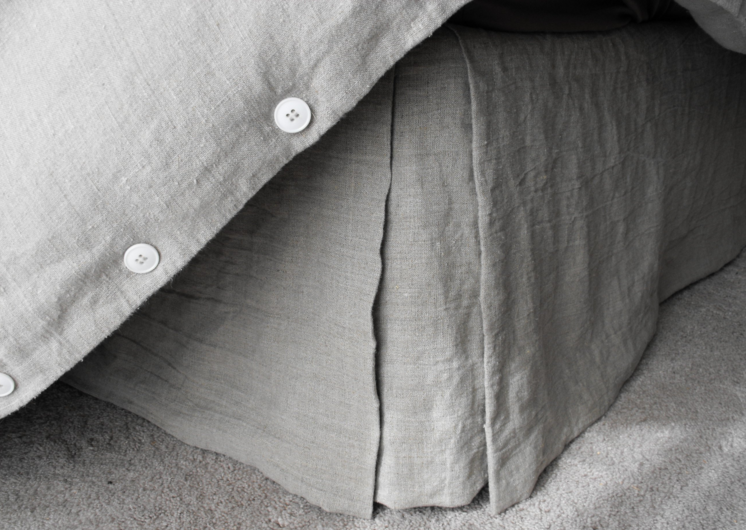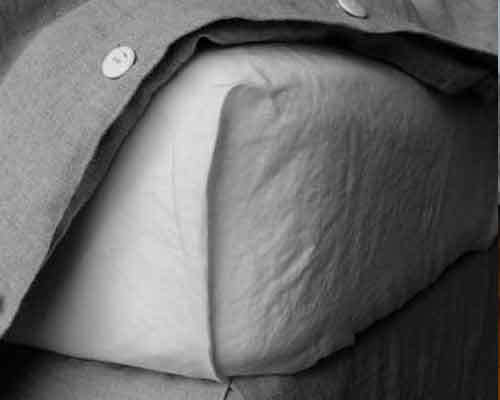If you count all the hours we allot to plumping pillows, smoothing sheets, straightening shams, and fussing over how the whole thing looks, we spend as much time on our beds as in them. Yet the results never look as good as pictures in magazines. Enough already. I am a busy person and so are you. Here’s a foolproof system to make a bed inviting enough to make it hard to say goodbye each morning:
For tips on bed-making (and a philosophical discussion about what the state of your bed says about you), I turned to Tricia Rose, a bedding expert who owns Rough Linen and has given a lot of thought to the topic.
“Virtually any bed looks beautiful if it has a woman lying naked in it, on her side, seen from behind, with a sheet carelessly draped across her bottom,” Tricia said.
“I could try that, I suppose, but I don’t know if it’s sustainable,” I said. “What about on days I have to go into the office? How can I make it look good then?”
“Easy,” she said. “You have to get to the heart of it–what is your bedroom for?”
Above: Photograph of Justine Hand’s Cape Cod house by Matthew Williams from Remodelista: A Manual for the Considered Home.
Your bedroom is the most private room in the house, and it should be the most personal. Your bed should feel like the ultimate sanctuary and make you happy every time you get into it. “Show-off-y beds are a thing of the past,” Tricia said.
So are fussy pillows–remember the era of “my husband has to throw 14 tiny pillows onto the floor so he can get into bed?” It’s over. Instead:
Secret No. 1: Get the right pillows. By all means keep your favorite pillow–the flat, dingy one you’ve been carting around since childhood because it has just the right squish factor to lull you to sleep–but also invest in a pair of beautiful goose down pillows. On her bed Tricia has a White Goose Down Pillow; available in standard, queen, and king sizes at prices ranging from $104.99 to $172.49 at Warm Things.
Goose down pillows will look plump and make your bed look welcoming no matter whether you lay them flat or prop them against the headboard. “Some people do pillows like a stack of pancakes and others like magazines in a rack that faces forward, and either looks good,” said Tricia.
Above: A set of standard size Garment-Dyed Linen Pillowcases is $65 and a Garment-Dyed Linen Flat Sheet is available in 18 colors; from $55 to $109 depending on size at Restoration Hardware.
Secret No. 2: Buy a bolster. Then push it up against the headboard and leave it there. A twill 30-inch-long Bolster Cover is available in eight colors for from $39 to $89 and a 30-inch-long Synthetic Bolster Insert is $26; both from Pottery Barn.
“If you read in bed, having a bolster to fill in that horrible corner where the mattress meets the headboard, feels so much better,” said Tricia. “And it’s no work at all, because you don’t touch it. You don’t have to move it to make the bed in the morning. It stays put.”
Above: Bed linens made of linen; a Pure Belgian Linen Sheet ($154 for queen size) and a lightweight Summer Cover ($220 for a queen size) are available from Rough Linen.
Secret No. 3: Instead of cotton sheets and pillow cases, put linen on your bed. (After all, this category of textiles is called bed linens for a reason.) “What I love about linen is you can stand at the end of the bed and with both hands go ‘flick,” and it looks beautiful, wrinkles and all,” Tricia said. “It doesn’t have to be perfectly smooth or perfect at all, because linen already is perfect.”
Linen linens look good even when mussed. But I have to point out this is not the way I was taught to make a bed. Housekeeping had very strict rules. My mother ironed bed sheets and taught me to make hospital corners before she taught me to read. On each bed: a fitted sheet, a top sheet, a blanket, a quilted bedspread, and two pillows. She folded back the spread, precisely placed pillows on it, then re-folded. Bed making took about 10 minutes, and the result looked like a dead body was lying under the spread at the head of the bed.
How did your mother make the bed? Prepare yourself emotionally for Tricia’s next suggestion; my mother (and probably yours) would consider it heresy:
Above: Photograph of Stefanie Brechbuehler and Robert Highsmith’s house in Gallatin, New York by Matthew Williams from Remodelista: A Manual for the Considered Home.
Secret No. 4: Ditch the fitted sheet and instead tuck in a flat sheet around the mattress. “Fitted sheets are an excrescence,” said Tricia. “Mattresses are all different depths. Fitted sheets never fit properly and they never look good.” Instead, she suggests, use a big flat sheet–if necessary, buy one that’s a size larger than your mattress–and tuck it tightly around the mattress.
(Fitted sheet or no? Where do you stand on the subject? Tell us in the comments section below.)
Above: A generously sized Flat Sheet big enough to be tucked in all around the mattress is available in five sizes at prices ranging from $140 to $220 from Rough Linen.
Housekeeping is a personal thing. Next to religion, I can’t think of a topic on which I have stronger opinions. (Don’t get me started on bleach.) Your mother, like mine, knew how to make hospital corners. Perhaps you still employ this technique every time you make a bed. If not, re-learn; eighteen-year-old Army recruits can do it. Here’s a Basic Training Video to refresh your memory.
Secret No. 5: You don’t need a top sheet. Instead, stuff a comforter inside a duvet cover (preferably a linen one) and let the cover do the job of a sheet. “The only function of a top sheet, if you have a duvet, is to wrap itself around your legs while you sleep and to become untucked,” said Tricia.
Bonus: by eliminating a top sheet, you will be able to make the bed faster and more easily in the morning.
Above: A White Goose Down Comforter is from $338 to $568 depending on size and a Down-Alternative Comforter is from $118 to $148 depending on size from Garnet Hill.
Secret No. 6: Buy the right size comforter insert to stuff inside the duvet cover. “The silly thing is there isn’t a standard for the sizes of duvet infills, so you can’t just buy ‘queen’ or ‘king’ and be done with it; you have to measure your duvet cover,” said Tricia. “To fill it up, buy an infill that is at least two or three inches larger. You can even buy one that’s six inches larger, and the infill should mush nicely in there.” On Tricia’s bed is a Down Comforter from Warm Things.
Secret No. 7: Buy non-slip casters and place them under the feet of your bed to keep it from moving. Then you can lean against the headboard and read without fearing you will slide all over the room. Under her bed’s legs, Tricia has placed a set of Non Slip Furniture Cups; they’re $16.21 for a set of four from Wayfair.
“This is all I have to do to make my bed look as good as if a naked woman were lying in it on her side?” I asked.
“Well, to make it look nearly as good,” Tricia said. For some things, there is no substitution.
See more Domestic Dispatches for a Closet Cleanout: 10 Essential Clothing Pieces and How to Care for a Fiddle Leaf Fig Tree.
N.B.: This is an update of a post published March 18, 2013 during Loft Living week.
























Have a Question or Comment About This Post?
Join the conversation (49)